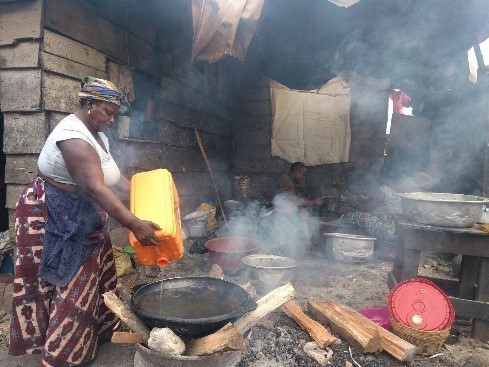Improving air quality in Accra, Ghana by integrating health into policymaking
Ambient and household air pollution are major causes of death and disease globally. Over 90% of urban dwellers are exposed to polluted air worldwide. In addition to causing ill health, short-lived climate pollutants, such as methane, black carbon and tropospheric ozone, are also significant contributors to climate change. In Ghana, the levels of air pollution are affected by seasonal variation. During the dry season (November to March) there are high peaks due to desert dust. Nevertheless, throughout the year, anthropogenic sources of air pollution are responsible for keeping average values high and for serious health impacts. Levels of air pollution in Accra are significantly high and levels of air pollution in Greater Accra are high [1]. It has been estimated that if 2015 levels of air pollution—in excess of WHO Air Quality Guidelines—remain in Greater Accra, air pollution will be responsible for 70 000 years of life lost in the adult population. Since the 2015 World Health Assembly resolution on Health and the environment: addressing the impact of air pollution (WHA68.8), WHO has worked closely with the Government of Ghana and other partners to implement the Urban Health Initiative which aims to reduce deaths and diseases associated with air and climate pollutants and enhance health co-benefits from policies to tackle urban air pollution and short-lived climate pollutants, saving lives by linking health, environment and sustainable development. Assessments of the health impacts of air pollution are now being given full consideration in policies related to transport, waste, land-use and energy.

Photo Credit: © Abraham Mwaura/WHO
Photo Caption: In Accra, Ghana only 11% of households exclusively use clean cooking fuels and technologies. The Urban Health Initiative’s household energy analysis estimated 1848 averted deaths annually by 2030 in a household energy policy scenario which shifts strongly to cleaner fuels and technologies.
How did Ghana do it, and how did the WHO Secretariat support Ghana?
A pilot project was launched in Accra in 2016 to support the health sector and demonstrate the full range of health benefits that can be achieved from implementing air pollution and short-lived climate pollutant reduction strategies. Interventions of the project rest on four pillars:
- Applying multidisciplinary approaches, methodologies and tools to address the health impacts of urban policies;
- Assessing policy measures to reduce air pollution and win multiple public health gains in the household energy, waste, land-use and transport sectors;
- Fostering health sector competencies, engaging key stakeholders, and working with the Ghana Health Services to raise awareness about air pollution and health with health workers and their patients; and
- Conducting health communications campaigns (BreatheLife Accra) to raise public awareness about the connection between climate change, air pollution and health, and catalyse action for the reduction of emissions.
The WHO Air Quality Guidelines recommend limits for concentrations of key health-harming air pollutants based on global scientific evidence. Assessments of policy scenarios to address air quality in Accra showed that meeting WHO Air Quality Guideline values could prevent 1790 deaths annually in Greater Accra, corresponding to an estimated health economic burden of approximately 247 million US dollars [1]. The most ambitious policy scenario to reduce household use of charcoal as a primary cooking fuel in Accra by 2030, for example, was estimated to prevent 1848 deaths annually. A long-term policy scenario with a significant shift from the use of passenger cars to efficient public transport, walking and cycling would result in up to 5500 averted premature deaths from improved air quality, and an additional 33 000 saved lives due to increased physical activity, with an overall estimated health economic savings of 15 billion US dollars over a 35 year period.
The Urban Health Initiative helped build capacity of the health sector to engage across sectors to address air pollution and its health impacts. This allowed for examination of the impacts and challenges in sectors responsible for air pollution, such as household energy, transport, waste, and land use (including green spaces). Discussions on the implementation of the WHO Air Quality Guidelines were held with stakeholders in Ghana. Key results include incorporation of the Urban Health Initiative’s health recommendations in the 2018 Greater Accra Air Quality Management Plan, the 2019 Accra Resilience Strategy, and the 2020 Accra Climate Action Plan. The initiative has also generated interest from the Ghana Ministry of Transport to incorporate health assessments into the regulatory framework.
Accra has become a leading city for implementation of air quality and health strategies by providing technical information, lessons learned and guidance for other countries in the African region. In the next phase, with further activities planned in Ghana for 2022 and 2023, a strategic challenge is to implement a policy tracking framework that is applicable across the region. Capacity-building remains one of the pillars of the project, with WHO piloting a course for the health sector in Ghana, including training modules on air pollution and health for clinicians and public health practitioners.
REFERENCE
[1] https://www.who.int/publications/i/item/9789240022294
Photo Credit: © Abraham Mwaura/WHO
Photo Caption: In Accra, Ghana only 11% of households exclusively use clean cooking fuels and technologies. The Urban Health Initiative’s household energy analysis estimated 1848 averted deaths annually by 2030 in a household energy policy scenario which shifts strongly to cleaner fuels and technologies.
